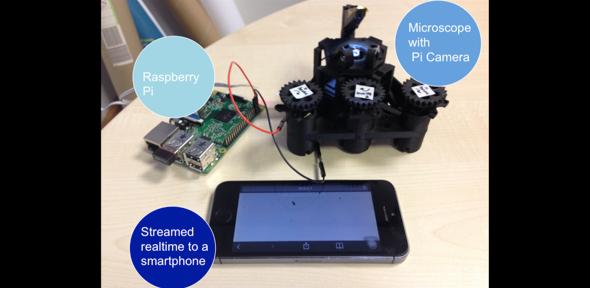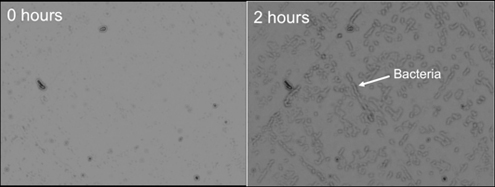
Submitted by Christine Alexander on Thu, 26/05/2016 - 08:44
Alex Patto, a member of the O'Kane Group, was part of the team who won £5,000 in the Social Enterprise category for their business plan for Waterscope at the Cambridge University Entrepreneurs event in May.
Waterscope, developed by members of the Department of Physics Dr Richard Bowman, Dr Nalin Patel and Tianheng Zhao, as well as Alex, provides water quality testing at relatively low cost and with much greater ease of use in remote areas.
The standard test for water is to incubate it and check for the development of bacteria. The process is speeded up considerably with observation through a microscope. Waterscope thus uses a 3D-printed microscope linked to a Raspberry Pi [as in carousel image above]

Above : Bacteria are visible under a microscope in as little as 2 hours
Alex told the Cambridge Evening News:
“We want people to be able to do a test and get real-time feedback. At the moment tests in developing countries are usually carried out externally - an organisation will come in, test the water, then go away again. The residents might not hear from them for a week or a month ... With our system we hope to collect data so that we can eventually map water quality and see hot spots for contamination."
Read more about the award at:
- http://www.cambridge-news.co.uk/Cambridge-University-s-best-entrepreneurs-pick/story-29279414-detail/story.html
- http://www.cambridge-news.co.uk/Waterscope-developing-cheap-simple-test-water/story-29279550-detail/story.html
Alex Patto explains further:
" WaterScope is a limited company founded in July 2015. It was initially a spin-out from the Cambridge development i-Teams project investigating water testing methods. Our microscope was part funded by a £5,000 grant from the Cambridge Synthetic Biology SRI (SynBioFund) to develop it as a biological research tool, and the team obtained a Cambridge “Try It” Award in July of £500 to develop a water testing product. Since then, we have raised over £15,000 of non-dilutive funding. The first prototype has been built to ascertain proof-of-concept and we have demonstrated its use in an incubator to follow bacterial growth. In parallel, the microscope has been trialled in India and Gambia as an educational tool, partnering with several initiatives. Our inventor Richard [Bowman] has been accepted on the Forbes 30 under 30 list.
We will develop a fast and inexpensive water testing method that quantifies bacterial contamination within 1-2 hours, ten times faster than current technology. It will be significantly smaller, lighter and cheaper than today’s tests, allowing more sites to be monitored frequently. We will supply low-cost sterile consumables to simplify the system. Our test will also measure pH, free chlorine and turbidity, similar to currently-available kits. Moreover method will allow rapid testing of many different pathogens such as E. coli, Listeria, Legionella and pathogenic E. coli 0157. Once developed, this will be the fastest bacterial test kit available. Results will be automatically uploaded to a database, enabling real-time mapping, review and intervention. The test can be used by anyone, in any location, enabling permanent hubs for testing to be set up in schools/communities. We will empower rural communities to understand what contaminates their water, and to test their own supply if needed. Our technology will encourage a bottom-up approach to water testing, where villagers no longer rely on external workers to know if water is safe to drink. "
The future
Waterscope was launched on 13 June at the Centre for Global Equality (Humanitarian Centre). The next step is to market kits to hobbyists and Raspberry Pi enthusiasts. Then kits will be introduced into schools for testing, and after 2 years the kits will be marketed to NGOs and aid agencies. The Head of Water and Sanitation at Oxfam is already working in partnership with Waterscope [as well as other organisations].
An interview has been filmed for Cambridge TV, and should be aired shortly.
Waterscope website : www.waterscope.org
Should you obtain a kit, assembly instructions can be found on : http://www.waterscope.org/instructions/
See more
>> Alex Patto and Tianheng Zhao interviewed on Cambridge TV
Read more
>> Cambridge Evening News story, 16 May
